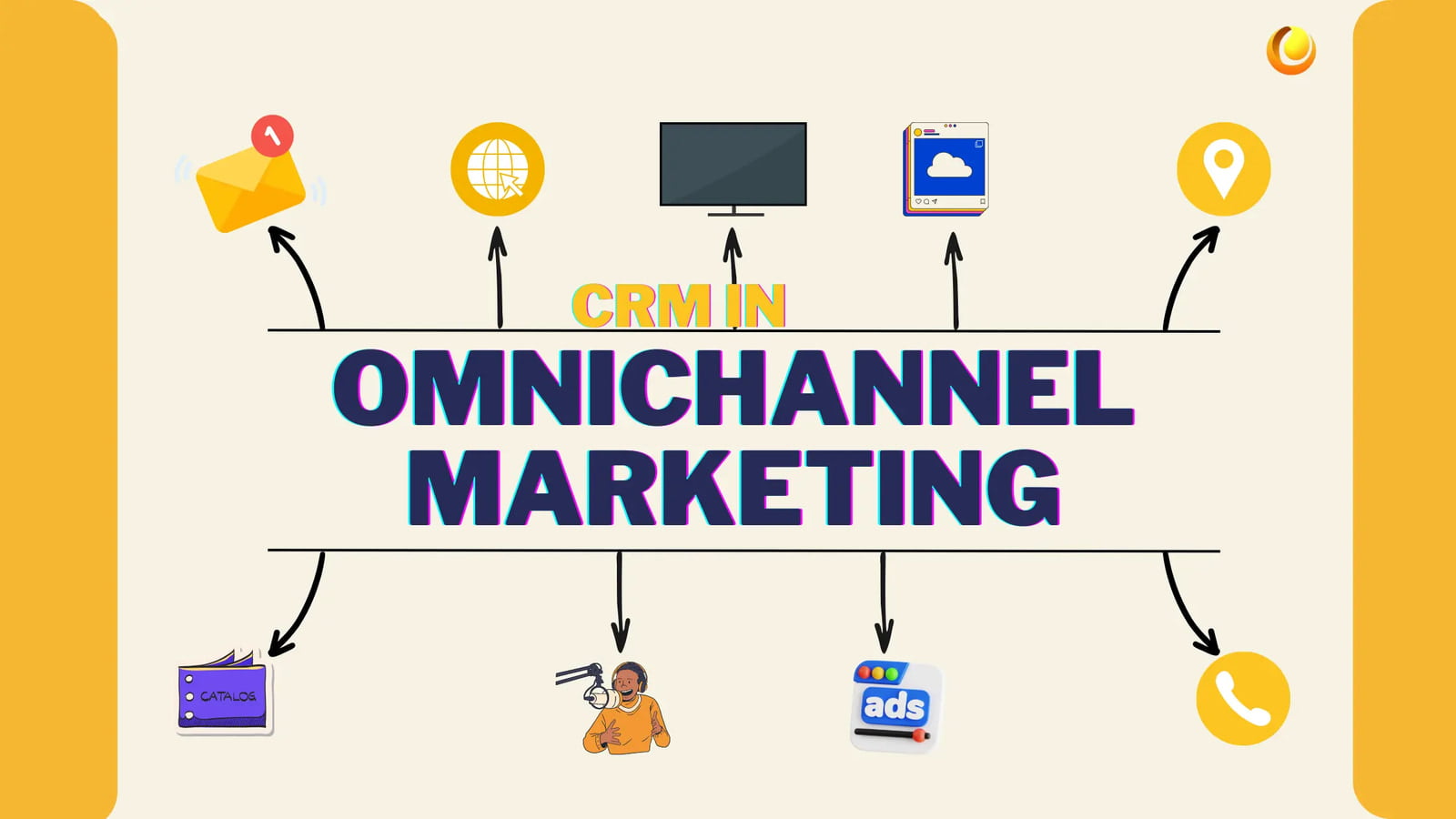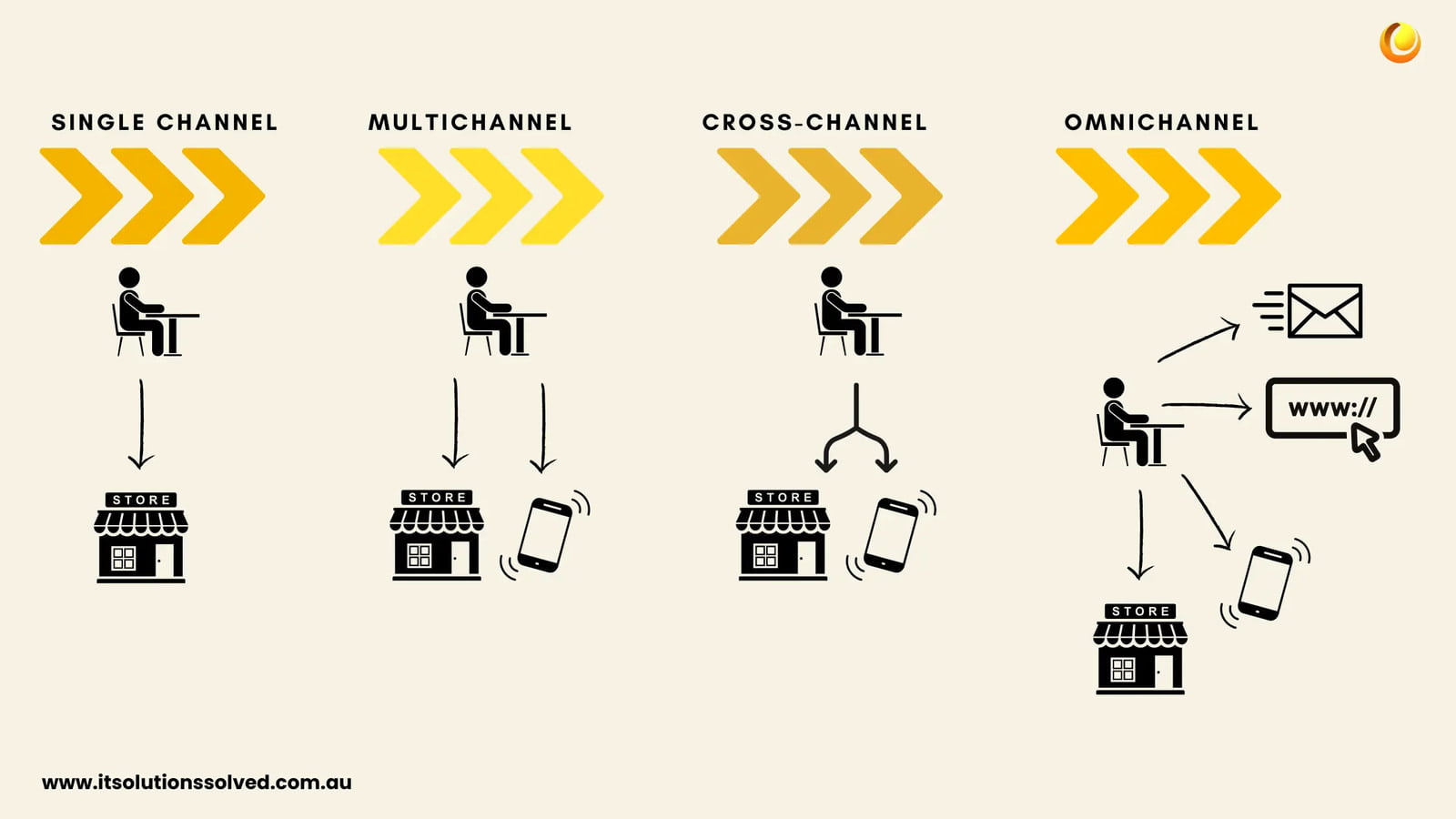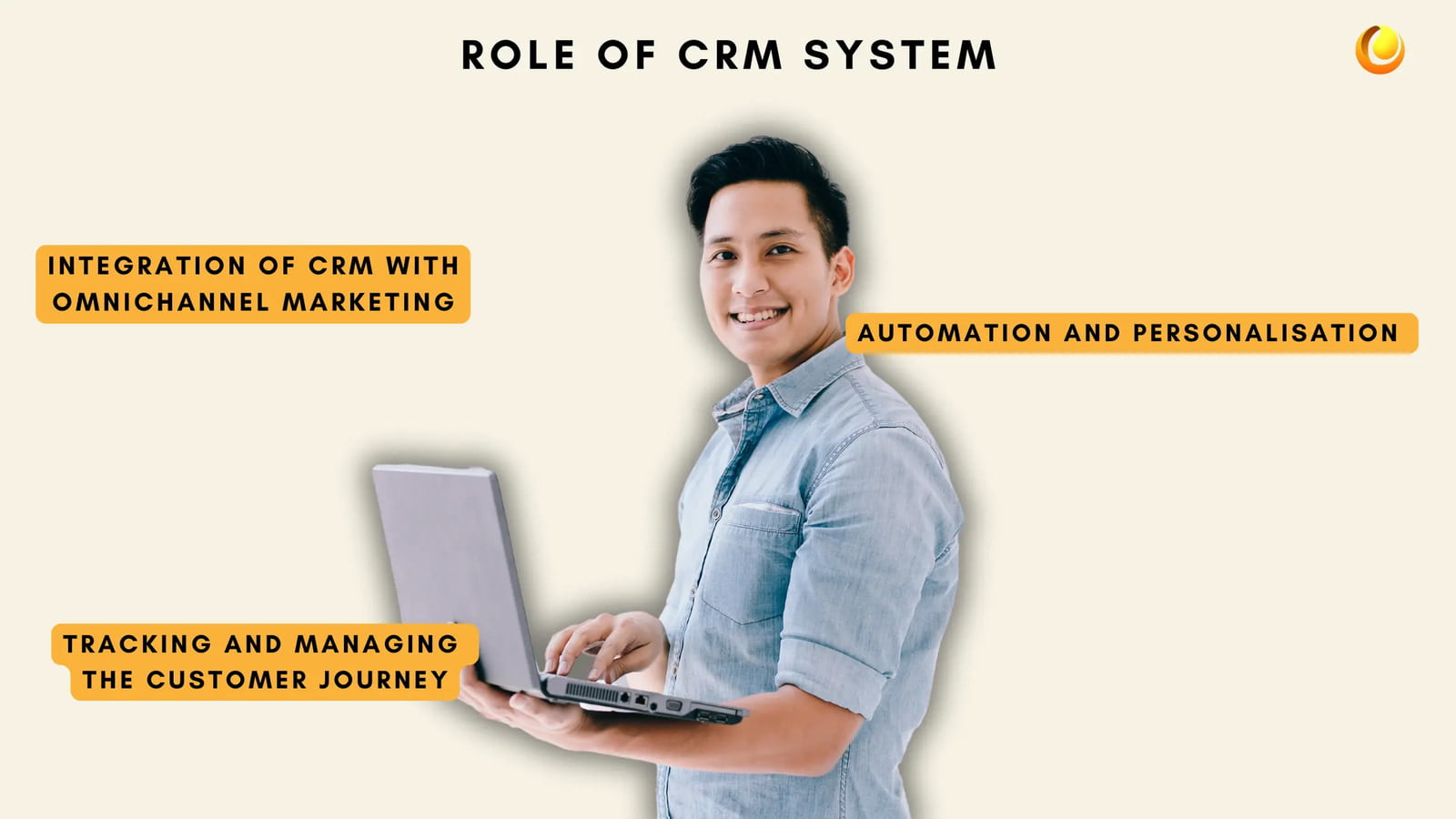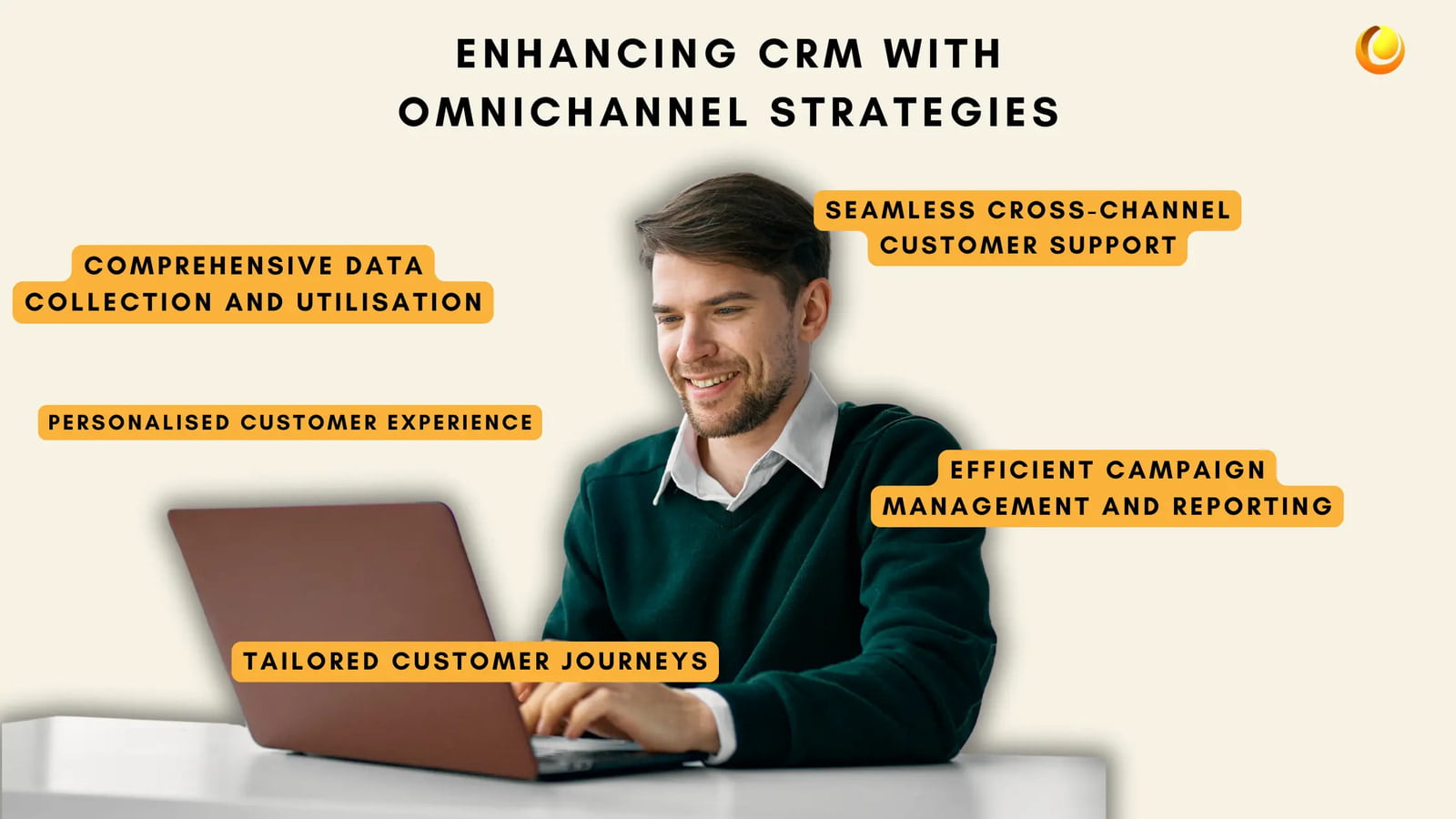
List of Content
- Understanding Omnichannel Marketing
- The Role of Data in Omnichannel Marketing
- CRM: The Backbone of Omnichannel Marketing
- Enhancing CRM with Omnichannel Strategies for better Customer Experience
- Implementing an Omnichannel Marketing Strategy
- Overcoming Challenges in Omnichannel Marketing
- Measuring Success in Omnichannel Marketing
- Conclusion
Understanding Omnichannel Marketing
What is Omnichannel Marketing?

Multichannel marketing on the other hand is a strategy that seeks to engage customers through different platforms for instance e-mails, social networks, and physical stores and each of the channels tends to operate in isolation most of the time. For instance, a customer receives one message in an email and completely a different message in a social media ad that is wrong. On the other side, omnichannel marketing integrates several channels to ensure that the information conveyed to the customers is blended in terms of the promotion being made, offers to be made or the brand image being portrayed and further enhance customer experience.
It is beneficial to your organisation if your team has reviewed the client's lifecycle; this knowledge may be used to fine-tune the client engagement process. For example, if a consumer promises to pay for a product placed in an online store's basket but then drops it and walks away, an application can be created to notify the individual customer by email or a post on their profile's wall to compel them to purchase.
The Role of Data in Omnichannel Marketing
Harnessing Data for a Unified Customer Experience
At the heart of omnichannel marketing is data. The ability to collect, analyze, and leverage data from various touchpoints is what makes this strategy so powerful. By gathering data from every interaction a customer has with a brand—whether online, in-store, or via mobile—businesses can gain a comprehensive understanding of customer behaviour and preferences.
Creating Detailed Customer Personas
The first step in developing an omnichannel approach is through customer personas. These are created from actual data drawn from areas such as purchase details, website activity, social media activities, and details of site users. Customers can be then segmented into personas, and the advertising and promotional materials need to vary across the personas.
For example, a retail brand could realise that its population includes a specific subgroup of consumers who frequently buy apparel for sporting activities. With this kind of information, the brand will be in a position to assess this group by offering targeted promotions that give them new offers, such as discounts on other new sportswear or suggestions of other products that might complement the sportswear. This level of personalisation befits a fiercely competitive marketplace and improve customer experience because customers yearn for activity that mirrors individual requirements and wants.
Real-Time Data and Adaptive Marketing
Omnichannel marketing also relies heavily on real-time data. By monitoring customer interactions as they happen, businesses can adapt their marketing strategies on the fly. For example, if a customer visits your website and adds a product to their cart but doesn’t complete the purchase, you can use real-time data to trigger a personalised email reminding them of the item they left behind, along with a discount to encourage the sale. And data is very fruitful for improving marketing efforts, product quality and features and enhanced customer experience as well
This real-time approach allows for more responsive and relevant marketing, increasing the likelihood of conversion and enhancing the overall customer experience. Additionally, by continuously analyzing data, businesses can identify trends and patterns that can inform future marketing efforts, ensuring that strategies remain effective and aligned with customer expectations.
CRM: The Backbone of Omnichannel Marketing

The Critical Role of CRM Systems
Customer Relationship Management (CRM) systems play a pivotal role in the success of an omnichannel marketing strategy. A CRM system serves as a central hub for all customer data, ensuring that every interaction is informed by the most up-to-date information. This centralisation is key to delivering a seamless and personalised customer experience.
Integration of CRM with Omnichannel Marketing
In an omnichannel environment, CRM systems do more than just store customer data—they provide valuable insights that can inform marketing strategies. By integrating data from various touchpoints, a CRM system offers a 360-degree view of each customer, revealing patterns and preferences that can be used to personalise interactions.
For instance, if a customer frequently engages with a brand via social media but rarely opens emails, a CRM system can help adjust the marketing strategy to focus more on social media interactions for that particular customer. This ensures that every touchpoint is optimised for engagement, increasing the likelihood of conversion and improve customer experience.
Automation and Personalisation Through CRM
One of the key benefits of integrating CRM with omnichannel marketing is the ability to automate personalised interactions. CRM systems can automate tasks such as sending follow-up emails after a purchase, triggering personalised offers when a customer abandons their cart, or segmenting customers based on their behaviour and preferences.
For example, a customer who frequently purchases skincare products might receive automated recommendations for new products in that category, along with exclusive discounts. This level of implemented automation not only improves efficiency but also ensures that customers receive timely & relevant communications, improving their overall customer experience with the brand.
Tracking and Managing the Customer Journey
CRM system also has another function that aims at assisting in tracking and controlling the customer relationship. From all available contact channels, it is for instance possible for a CRM system to provide a unified picture of a customer’s interactions with the brand. This is perfect when developing complex marketing strategies that need to appeal to the customer’s emotions and get a reaction out of them and further enhance customer experience.
For example, if a customer follows your website, likes and comments on your social media content and purchases in a physical store, the CRM system can have a summary of all these activities. Such data can in turn be utilised to guide the organisation’s future marketing campaigns so that each contact is relevant to the customer’s profile and actions.
Enhancing CRM with Omnichannel Strategies

Elevating CRM Capabilities with Omnichannel Marketing
Thus, the integration of CRM systems with omnichannel marketing concepts increases the effectiveness of both such systems and marketing concepts. Here’s how omnichannel marketing can elevate your CRM capabilities and enhance customer experience: Here’s how omnichannel marketing can elevate your CRM capabilities:
Comprehensive Data Collection and Utilisation: This is because omnichannel marketing makes it possible for a business to get a large amount of information about the customer from various sources, unlike a single-channel marketing strategy. It can be utilised for improving the CRM capabilities, to develop a more precise categorisation of the customers and the messages that they are receiving. For instance, it is easy to monitor customer engagements on social media, emails, and face-to-face physical contact which makes it easy to establish the market base and preferences. The more you know about your customer the more you can provide and hence better customer experience.
Seamless Cross-Channel Customer Support: In omnichannel marketing, the customer support aspect can be combined thus creating a smoother processing mode. For example, a customer may Ticket through Twitter customer care and then switch to emailing the company directly. In a CRM environment, all communications are captured at a single point and this means that support staff is fully aware of all the other communications this particular customer has had with the organisation through whatever other channel. Besides, boosting the first-contact resolution rate leads to multiple benefits in boosting the overall efficiency of customer support.
Personalised Customer Experience: The primary importance of any form of marketing is the enhancement of the customer experience and this is where omnichannel marketing stands out. Thus every time that companies interact with their customers the process is enjoyable and engaging. For instance, if a client receives an email with recommendations based on an analysis of his or her browsing history this will make the customer feel valued by the company and hence more likely to make repeat purchases.
Efficient Campaign Management and Reporting: Most omnichannel marketing techniques are end-equipped with strong analytical and researching tools which can easily be linked to CRM systems. It becomes much easier for businesses to have an overview of the impact that their marketing campaigns are having in real time; this will enable easy identification of aspects that need adapting or dropping altogether. For instance, there may be low response rates to a certain kind of email promotional campaign over a given period; by using the insights your CRM has provided you with, you will be able to correct this fast and ensure that your marketing turns out to be as successful as possible.
Tailored Customer Journeys: Another benefit of transitioning to CRM with the help of omnichannel marketing is the possibility of designing a unique customer journey (tailored customer journey is very important aspect when you want to improve customer experiences). It also refers to the use of data captured from various touch points that will enable businesses to market their products as well as offer services fitted to the specific behaviour of individual clients. For instance, a customer who has a buying history of sportswear will be targeted with new products in that line and with special offers and promotions. Besides, promoting sales, such an approach of segmentation enhances the client’s bond with the company’s brand.
Implementing an Omnichannel Marketing Strategy
Strategic Steps for Omnichannel Implementation
Switching to an omnichannel marketing approach is not an easy thing and requires consideration of the following factors:
Here are steps to guide you through the process:
Centralise and Integrate Customer Data: To implement an omnichannel marketing strategy the first thing for me as a marketing manager is to gather all customers’ data. This includes website data, social media, e-mail marketing and in-store data which are linked to the CRM system. Data integration therefore warrants every team official is well equipped with the same information to enhance a consistent attack based on an individualised customer approach and improve customer experience.
Develop and Refine Customer Personas: It is essential to know how the localisations look after your data is centralised, the next concept for you to understand is a detailed customer persona. These personas are built to encompass probably different parts of your target audience based on various characteristics including age, buying behaviour, or previous interaction. In every persona, there are always varied needs as well as preferences which if analyzed then you can market your products well.
Integrate & Align Marketing Channels: The meaning of omnichannel marketing is the connection and utilisation of all the marketing channels. This means that your internet site, your social media presence, your e-mail and newsletter, and the signage and deals that you offer in your physical stores must be congruent and consistent. the better you use CRM, the better customer experience you can provide.
Leverage Automation & AI: Automation is crucial in omnichannel marketing, enabling businesses to efficiently manage and personalise customer interactions at scale. Integrating AI tools with your CRM can automate customer segmentation, trigger targeted campaigns based on real-time behaviour, and optimise messaging across channels. For example, AI can analyze customer data to predict future purchases and suggest relevant products or services in real time.
Consistent Branding & Messaging: Maintaining consistency across all marketing channels is essential in omnichannel strategies. This means that whether a customer interacts with your brand through social media, email, or in-store, they should experience the same tone, style, and messaging. This consistency helps reinforce brand identity and builds trust with customers. Create detailed brand guidelines that apply across all channels to ensure that every touchpoint reflects your brand's values and voice. Branding will make customer more value and enhance customer experience on psychological level.
Real-Time Monitoring and Optimisation: The effectiveness of an omnichannel strategy depends on continuous monitoring and optimisation. Use analytics tools to track customer interactions & campaign performance in real-time. This data should be integrated into your CRM to provide a complete view of customer journeys and allow for timely adjustments to strategies. For example, if a specific ad campaign is underperforming on one platform, you can quickly reallocate resources or modify the messaging to improve results.
Cross-Departmental Collaboration: Thriving omnichannel marketing requires collaboration across various departments, including marketing, sales, customer service & IT. Each department plays a role in creating a unified customer experience, and effective communication between teams is vital. Regular meetings and shared goals can help ensure that all departments are aligned with the omnichannel strategy. For instance, marketing and sales teams can collaborate on lead nurturing campaigns that integrate CRM data with personalised outreach efforts. You can utilise tools like Zoho Cliq to enhance cross-departmental colloaboration.
Overcoming Challenges in Omnichannel Marketing
Data Integration: One of the major issues of omnichannel marketing is the problem of data from different channels being fed into the CRM system. So many organisations experience a problem of data isolation, where data about the customer is stored in different databases. To combat this, buy in data integration tools, which can collate all the collected data, and offer up a single customer persona. Not only does this increase differing levels of personalisation, but also decision-making throughout the organisation which further improve customer experience.
Resource Allocation: The use of an omnichannel strategy is likely to be costly and may result in being comprehensively precious, most likely for small to medium-sized enterprises. One cannot go omnichannel all fired up at once and it becomes important to align with the channels where your customers are most engaged and then slowly build on from there. Choose particular platforms that are relevant to your niche and try to maximise the success of these particular platforms before expanding your efforts. Also, it is integrating technology to get the most out of your advertising endeavours without having to dedicate so much work by hand. the better resource allocation will improve both productivity and customer experience.
Maintaining Consistency: Coordinating the message should not be tough but at the same time, it may present a major problem since various teams are often responsible for the various channels. To achieve consistency, define some rules in the organisation of the brand personality regarding the tone, message, and imagery. Auditing the marketing materials across the different channels can also be a way of realising that there are inconsistencies in the marketing messages, and correcting them. Besides, the application of consistency strengthens a brand image and also guarantees that customers get the same ideas wherever they meet your brand. It will improve and enhance customer experience.
Adapting to Changing Customer Expectations: Consumer behaviour being volatile means that what is accepted today need not be accepted tomorrow. To combat such changes, there is a need to adopt strategies that enhance the monitoring of the customers. Using your CRM to monitor customers' preferences and behaviours would be useful in case you embarked on a certain strategy that was not yielding the results that were expected. For instance, if one realises that the customers are coming through the mobile applications instead of Emails, then the marketing strategy has to be reoriented to the mobile applications. When you meet and goes beyond the customer expectation, the customer experience will skyrocket and more words will spread in the market.
Ensuring Data Privacy and Compliance: Because of the emphasis on data-driven marketing, there have been concerns about privacy violations and failure to meet the legal requirements. It must also be made sure that your omnichannel strategy is concretely aligned with the data protection acts such as GDPR or CCPA to protect customer’s data. Incorporate strict data protection measures and policies that show how customer data is utilised in the business. Also provides customers with an option of prohibiting or permitting the collection of data by firms.
Measuring Success in Omnichannel Marketing

Key Performance Indicators (KPIs):
To measure the efficiency of omnichannel marketing strategies with the improve customer experience, you have to define and control certain indicators. Some key metrics to consider include: Some key metrics to consider include:
Customer Lifetime Value (CLV):
This captures the amount of sales a particular customer would make over the entire period they engage with your brand. Any implementation of an omnichannel strategy should aim at an improvement of the CLV since it strengthens customer loyalty and repurchase propensity.
Customer Engagement Rate:
This is about tracking how the customers engage with the brand across various touch points. This encompasses features such as email open-rates, social media engagement and traffic to stores. A high engagement ratio means your omnichannel marketing is effective and provides value in the eyes of the consumer. More engagement mean customer like your product/service and further means better customer experience.Conversion Rate:
Track change in the response rate of customers out of the total number of people you have targeted through your marketing activities. A higher percentage of conversion would mean that the omnichannel strategy is efficient in pushing the customer through different stages in the sales funnel.Customer Satisfaction and NPS (Net Promoter Score):
Customer satisfaction indices and NPS scores give information on the customers’ attitudes towards the brand. Positive feedback and high NPS scores mean that your omnichannel strategy is in line with the customer’s expectations and improves brand identity. Customer satisfacion is directly depends on customer experience.Return on Investment (ROI):
An ROI will show how much the omnichannel marketing campaigns have returned against the amount of money spent. A positive ROI also assures you that while your strategy is successful, it can be maintained in the long run.
Conclusion
In conclusion, omnichannel marketing represents the future of customer engagement, offering a holistic approach that integrates all touchpoints into a seamless and personalised experience. By leveraging the power of CRM systems, businesses can gain a comprehensive understanding of their customers, optimise interactions, and deliver consistent messaging across all channels. While the journey to implementing an omnichannel strategy may present challenges, the rewards—such as increased customer experiences and loyalty, higher conversion rates, and improved ROI—are well worth the effort.
As technology continues to evolve and consumer expectations rise, staying ahead of the curve in omnichannel marketing will require ongoing adaptation, innovation, and a deep commitment to understanding and meeting the needs of your customers. By embracing the principles outlined in this guide, your business can create a powerful omnichannel strategy that not only meets but exceeds customer expectations and provide better customer experience, driving long-term success in the ever-competitive marketplace.
I hope, this post helped you! Would you be ready to take your business to the next spree with CRM? IT Solutions Solved will be right here.





